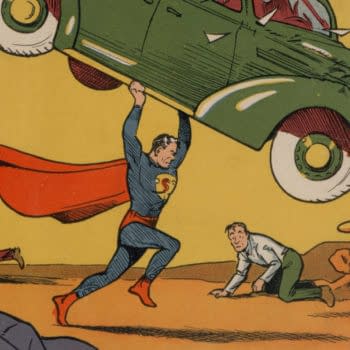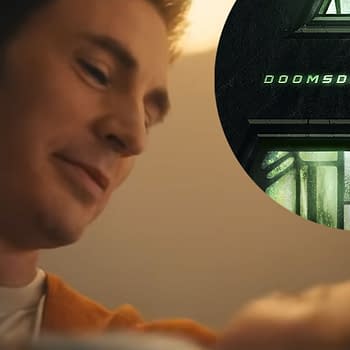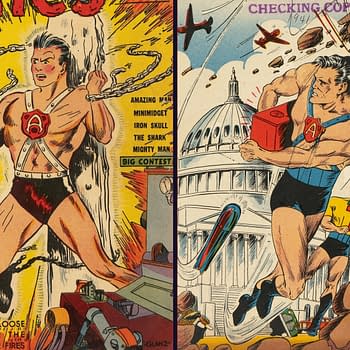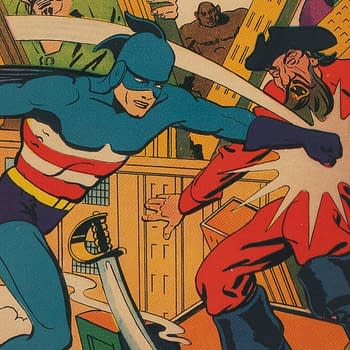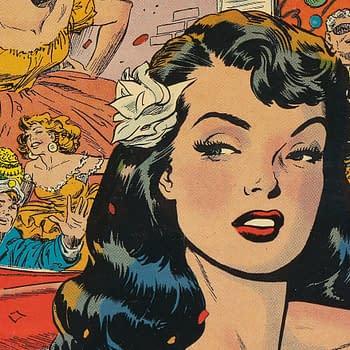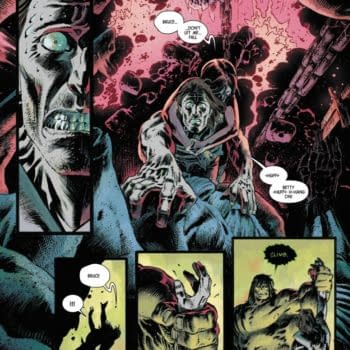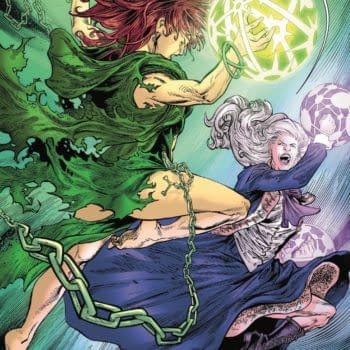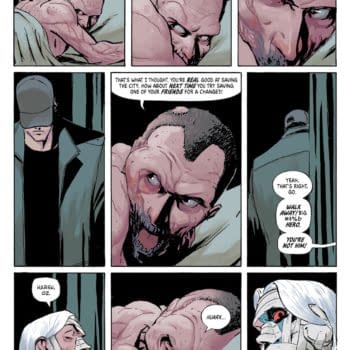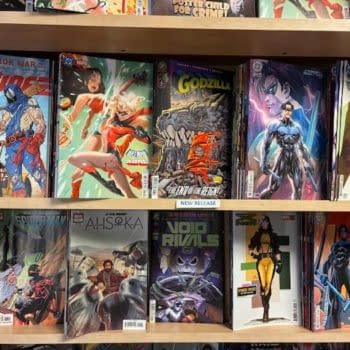Posted in: Comics | Tagged: Comics, dc comics, jack liebowitz, jerry siegel, joe shuster, superman, superman check
For Sale At Auction: The Check That Bought Superman
In October 2011, the comics industry was stunned by the news that an unimaginably important artifact of our history had surfaced nearly 75 years after it had been issued: The check used by Detective Comics, Inc (the company which was to become DC Comics, of course) to buy the rights for Superman from Jerry Siegel and Joe Shuster for $130 had surfaced in the hands of auction house Comic Connect. And it would soon be put up for sale.
As a comics history buff, I found myself in se
We're about to find out. The check is now listed in a Comic Connect auction which runs from March 26 to April 16.
How did the check surface after all this time? According to Comic Connect, it was salvaged from the trash by a DC Comics employee in 1973:
In the early 1970's, Jerry Siegel & Joe Shuster once again found themselves embroiled in an unsuccessful legal battle with D.C. Comics for the rights to Superman. The decision of the court, once again in D.C.'s favor, was rendered in August 1973 and at the time was felt by all parties to be the last word on what was then a 35 year old dispute. [Mark's note: I believe the date here may be slightly off, as Siegel v. National Periodical Publications, Inc. was decided in October 1973. The case was appealed and the appeal was decided December 1974] (Unknown to anyone in 1973, Congress would soon pass the 1976 Copyright Act that allowed creators to take back certain copyrighted works under certain conditions, which would in turn launch the next 35-year high-stakes battle that is still not fully settled!)
So it was no wonder that one afternoon in the autumn of 1973, a group representing the triumphant legal team and the D.C. Comics executives had a "final" celebratory lunch meeting at the Metropolitan Club in New York City. Celebratory because, after all, D.C. Comics had prevailed not just in the latest litigation but in all of the prior disputes, dating as far back as the very first D.C. lawsuit in 1939 against Victor Fox and Wonderman. When the lunch meeting ended, a box of old court documents that had accumulated over the years was handed over to one of the D.C team. When the box was delivered back to the D.C. executive office, the employee was told, "Just throw it all out. We don't need any of it anymore!"
In addition to the piles of court papers and corporate records, the "Original Check" written to Siegel and Shuster for Action Comics #1 was discarded in the trash. Knowing that the check would have historical relevance, the D.C. employee salvaged it. For the next 38 years it was kept safe in a dresser drawer… until now.
The Line Items & Details
Note the Superman line item next to the amount $130.
Also note the total $412, with other line items including "D.C", "Adv", and "Fun". This would correspond to payments for work in Detective Comics, New Adventure Comics, and More Fun Comics, where Siegel and Shuster had strips such as Doctor Occult, Federal Men, and Slam Bradley published just prior to the debut of Superman.
Based on page count, the June 1938 cover dates, and a 1938 letter from Liebowitz which Siegel made public in 1975 (Liebowitz states, "When we started Action Comics, we agreed to give you $10.00 a page, which is $4.00 a page more than anyone else is getting for any features in any of our four books. In addition, we're paying you $9.00 and $10.00 a page for the other four features you are drawing for us."), here's how that likely breaks down:
- "Superman", $130: Action Comics #1 — 13 pages of interior Superman story, $10 per page. (Note: the cover of Action Comics #1 is a revised version of one of the interior story panels, and interestingly, Siegel & Shuster apparently did not receive an additional amount for it)
- "D.C.", $210: Detective Comics #16 — 13 page Slam Bradley story, 8 page Spy story, 21 total pages at $10 per page.
- "ADV.", $36: New Adventure Comics #27 — 4 pages Federal Men, $9 per page.
- "FUN", $36: More Fun #32 — 4 pages Doctor Occult, 2 pages Radio Squad. $4 per page Doctor Occult? $10 per page Radio Squad.
It's worth noting that the stories in More Fun don't quite fit in with the other rates. Here's my theory: Siegel and Shuster originally struck their deal for some of their earliest comic book material — including Doctor Occult — with DC founder Malcolm Wheeler-Nicholson, before Liebowitz and Harry Donenfeld took control of the company (Doctor Occult debuted in New Fun #6 cover dated October 1935, quite some time before this check was issued). And in this case, the feature was not going to continue under the new deal with Liebowitz.
Although $6 is a widely-quoted number for Wheeler-Nicholson's early Detective Comics era (1937) page rate payouts, it's clear that his financial woes were looming before this period (he took on a partner in Harry Donenfeld to start the Detective title, and Donenfeld and Liebowitz were running the company a year later). Since Doctor Occult didn't continue after this issue, it's possible that Liebowitz was simply tying up loose ends on one of the old Wheeler-Nicholson deals to get it off his ledger books: More Fun #32 is the last issue for Doctor Occult, and Radio Squad becomes a longer 6 page feature in the next issue, implying that it was part of the new rates (and one of the "other four features" Liebowitz mentions) moving forward.
Both Federal Men and Radio Squad also started in the pre-Liebowitz era, but in those cases, both serials continued running well after this check was issued and therefore were meant to be part of Siegel & Shuster's higher page rate deal. So, in addition to Superman, the "other four features" mentioned by Liebowitz in the page rate discussion would be Federal Men, Radio Squad, Slam Bradley, and Spy — and all of these are represented in this check payment. In any case, the page rate numbers above are a neat fit based on the info we have at hand.
The listing of the undated Superman line item as "Superman" rather than by its publication title (in this case, Action Comics) as the others are listed ("June D.C." for features in the June cover-dated issue of the Detective Comics title, etc), is another interesting curiosity. It could be, since Superman was a newly-launching feature while the others were all in progress, that Liebowitz was handling that line item in a different way (and of course, we see below that the contract for Superman was dealt with on the same day).
But it could also be that on March 1st, Liebowitz had simply not decided on a title or release schedule for his newly-launching comic magazine that would introduce Superman to the world.
We know from the transcripts of Detective Comics, Inc. v. Bruns Publications, Inc., that Liebowitz had determined in January 1938 that he wanted to start gathering material to launch another comic book. We also know that Action Comics #1 was first advertised in More Fun #31 — a title which was transitioning from bi-monthly to monthly with that May 1938 cover-dated issue, and which therefore might have appeared on newsstands as early as mid to late March.
Had the name of the title Action Comics not been decided as Liebowitz was cutting this check on March 1? Once he had secured the Superman material, did Liebowitz then settle on a cover and even a title as then influenced by the newly-acquired lead feature? We can't say for sure, but the Superman line listing and the timing of the check suggest it's possible (and incidentally, the court transcripts also give April 18, 1938 as the on-sale date for Action Comics #1).
Adding to this already rather stellar bit of comic book history on the front, the back of the check includes not only the endorsements of both men (spelled both incorrectly and correctly to account for Liebowitz's misspelling of both names on the front), but also an April 6, 1939 stamp for the U.S. District Court of New York, where it was used to prove DC's ownership of the character in Detective Comics, Inc. v. Bruns Publications, Inc.
This case was the first comic book-related lawsuit. DC brought a copyright infringement suit against publisher Fox Feature Syndicate due to the character Wonder Man's similarity to Superman. Wonder Man was created by Will Eisner, who testified during the case, along with other key early comic industry figures.
The Signed Agreement
An existing (rather poor) scan of the agreement that all parties signed on the same date serves to supplement what we know about the check. Here is a transcript of this document:
3/1/38
Detective Comics, Inc.
480 Lexington Avenue
New York, N.Y.I, the undersigned, am an artist or author and have performed work for strip entitled "SUPERMAN".
In consideration of $130.00 agreed to be paid by you, I hereby sell and transfer such work and strip, all good will attached thereto and exclusive right to the use of the characters and story, continuity and title of strip contained therein, to you and your assigns to have and hold forever and to be your exclusive property and I agree not to employ said characters or said story in any other strips or sell any like strip or story containing the same characters by their names contained therein or under any other names at anytime hereafter to any other person, firm or corporation, or permit the use thereof by said other parties without obtaining your written consent therefor. The intent hereof is to give you exclusive right to use and acknowledge that you own said characters or story and the use thereof, exclusively. I have received the above sum of money.
Joe Shuster
Jerome SiegelAccepted:
DETECTIVE COMICS, INC.
By Jack Liebowitz
The Testimony of Jack Liebowitz
As we've noted, the check became an exhibit in Detective Comics, Inc. v. Bruns Publications, Inc. little more than a year after it was issued. Pages from this court transcript created quite a bit of controversy when they surfaced publicly in 2010 on the Comics Detective blog for what they showed about Will Eisner's testimony. But they are also very illuminating in regards to matters related to the Superman check. Here is Jack Liebowitz's testimony as it pertains to his agreement with Siegel and Shuster, and specifically mentioning the check:
Q. Is the copy of "Superman" written for the plaintiff each month by Mr. Siegel?
A. Yes.The Court: Who is Mr. Siegel?
Mr. Manges: He is the author.
The Court: What is his first name?
The Witness: Jerome Siegel.
The Court: He is an employee of your company?
The Witness: He is.Q. You have a contract with Mr. Siegel for this copy, have you not?
A. We have a contract, yes.Q. Now will you tell us how the "Superman" feature came to you?
A. Well, when we contemplated a proposed publication of a new magazine we were looking around for some features. One of the features submitted was this "Superman" strip.The Court: Who submitted that?
The Witness: It was submitted through the McClure Newspaper Syndicate.The Court: By this Mr. Siegel?
The Witness: It was originally submitted by Mr. Siegel to the McClure Newspaper Syndicate and they couldn't use it at the time. We, being on good terms with them, and they knew that we were looking for some features for a new magazine, they submitted that strip to us for consideration. We decided to publish it.Q. And when was that?
A. About January, of 1938.Q. And thereafter did you enter into a contract with Mr. Siegel and Mr. Shuster?
A. Yes.Q. And Mr. Shuster is the man that does the drawings from Mr. Siegel's copy?
A. That is right.The Court: Make that clear.
Mr. Manges: One man writes it and the other man draws. Two men do the work.The Court: This was in January 1938?
The Witness: Yes.The Court: You mean that the letter press describing this extraordinary creature is written by one man — what is his name?
Mr. Manges: Mr. Siegel conceives all the story part; Mr. Shuster does the art work, the cartoons.
The Court: What is his first name?
Mr. Manges: Joe.Q. Did Detective Comics, Inc., buy the rights to "Superman" from Messrs. Shuster and Siegel on or about the 1st of March, 1938?
A. Yes.The Court: You bought the rights to "Superman"? What do you mean by that? You made a contract with them that they should do this for you? Did they copyright it beforehand or was it a common law copyright that they assigned to you? What happened?
Mr. Manges: I will offer documents.
The Court: I don't mean to be impatient.Q. I show you this paper and ask if that was entered into between Detective Comics and Messrs. Siegel and Shuster on or about March 1st, 1938 (handing witness paper)?
A. That is right.The Court: By this document, signed by both of them, they gave you exclusive rights to this creation of theirs called "Superman". Both the author and the cartoonist signed it. That is the beginning. That, in effect, is an assignment of common law copyright by both of these people. It is hard to conceive of just what you would call it because these comic strips become almost entities and, I suppose, one would call that an assignment.
Q. Mr. Liebowitz, you say by March 1st, 1938, the first strip of 13 pages had been drawn?
A. That is right.Q. Had it also been submitted to your company by them?
A. That is right, and paid for.Q. And have you with you the check referred to in the last exhibit, since the question of date has been raised?
A. (Producing paper and handing to counsel.)Mr. Manges: I offer in evidence a check dated March 1st, 1938, of Detective Comics, Inc., to Messrs. Siegel and Shuster for $412, including the first item of $130. (Marked Plaintiff's Exhibit 25)
Jerry Siegel's 1975 Press Release

As Siegel explains in the press release, Siegel and Shuster had given up their right to appeal the verdict after DC hinted it might finally make some sort of financial arrangement with them over Superman. But by October nothing had happened and, after decades of public silence, Siegel couldn't contain himself any longer. He wrote a furious, bitter, anguished indictment of DC's treatment of Siegel and Shuster.
Siegel's emotionally-charged scream of agony and frustration was also a desperate plea for help and understanding.
Siegel's statements at this time in the press release, and supporting correspondence with Liebowitz that he included, also add context to the payment amounts listed on the check:
In 1933, while still in high school, Joe and I created SUPERMAN in our homes in Cleveland, Ohio, at our own initiative and expense. This was years before we had any arrangement or dealings with back-stabber Liebowitz or his company. For almost six years all our hopes and dreams were concentrated on working on and developing SUPERMAN. We were determined in our efforts and refused to let anything or anyone discourage us.
In 1935, Nicholson offered to publish SUPERMAN in a comic book, but Joe and I rejected his publishing offer. In 1938, Joe and I accepted Liebowitz's offer to publish SUPERMAN because of Liebowitz's written and oral assurances that we could place our trust and confidence in him and deal with him "without any trouble." In the first year of SUPERMAN's publication, when SUPERMAN earned a fortune for its publishers and became a smash hit, Joe and I earned less than $15.00 a week apiece from SUPERMAN.
We were paid $10.00 per comic book page. That was $5 per page apiece to Joe and me. When I learned that SUPERMAN was a success, like Oliver Twist asking for more porridge, I requested of Liebowitz that Joe and I be paid more than peon rates for our SUPERMAN creation. I received the following response from the cheapskate who had assured me I would deal with him "without any trouble"…
On September 28, 1938, J. S. Liebowitz wrote to me: "Now, in reply to your letter. Frankly, when I got through reading it, it took my breath away. I did not anticipate that when I asked you to come to New York to discuss this matter of newspaper syndication, that you would want to take advantage of this visit and try to boost your price on 'Superman'."
I took the cheapskate's "breath away" by asking the businessman that Joe and I get more than $15 a week apiece because of the success of our creation SUPERMAN.
Liebowitz continued, in his letter: "You must bear in mind, Jerry, that when we started Action Comics, we agreed to give you $10.00 a page, which is $4.00 a page more than anyone else is getting for any features in any of our four books. In addition, we're paying you $9.00 and $10.00 a page for the other four features you are drawing for us – again $3.00 and $4.00 a page more than we are paying any other artist. Where you got the idea that anyone was receiving $15.00 a page I'd like to know. *** As far as the popularity poll is concerned, we have approximately 300 letters in reply to this contest. If you were so observant, you may have seen that the majority of these letters have not been opened as yet and I don't know whether 'Superman' heads the list or 'Zatara' or any other feature carried in this book. If you based the popularity of your strip on the basis of 300 replies, you are grossly exaggerating the importance of 'Superman'. Don't forget that there are 64 pages in the magazine and that there isn't any magazine being published today that can sell on the basis of any one feature, whether that feature is Pop-Eye, Mickey Mouse, or any other top-notch strip and if I thought for a moment that our magazine depended on your strip, I would certainly make every effort to avoid any such situation."
Liebowitz continued, in his letter: "As a matter of fact, we have today opened the other mail on the poll and we have found that 25% indicated 'Zatara' to be their favorite feature, 20% like 'Pep Morgan', 15% like 'Tex Thompson' and only 30% have designated 'Superman' as their favorite, the balance being scattered among the other features in the magazine, so come off your high horse." Joe and I were earning less than $15 a week apiece from SUPERMAN and because we wanted to earn a decent living from our creation SUPERMAN, Jacob S. Liebowitz demanded "come off your high horse."
I will continue quoting from this letter written by the man who is on the Board of Directors of Warner Communications. Liebowitz continued, in his letter of September 28, 1938: "IS IT POSSIBLE THAT BECAUSE WE TREATED YOU LIKE A HUMAN BEING – YOU SUDDENLY GOT A SWELL HEAD? IT MAY ALSO BE THAT YOU ARE UNDER THE MISTAKEN DELUSION THAT BECAUSE YOU CAME INTO TOWN TO A LARGE ORGANIZATION, WHICH GAVE YOU TIME AND SHOWED YOU EVERY COURTESY WHICH WOULD BE ACCORDED TO ANY BIG PERSONAGE, YOU CONSTRUED ALL THESE ACTIONS IN THE WRONG LIGHT, THAT WE WERE TRYING TO GET SOMETHING FROM YOU. THE CASE IS DISTINCTLY THE REVERSE. WE WERE TRYING TO GIVE YOU, AN INEXPERIENCED YOUNG MAN, THE BENEFIT OF OUR EXPERIENCE AND GOOD WILL, IN ORDER THAT YOU GET AHEAD IN YOUR AMBITION TO BECOME SOMEBODY IN THE COMIC FIELD. "DON'T GET THE IDEA THAT EVERYONE IN NEW YORK IS A 'GYP' AND A HIGHBINDER AND BECAUSE YOU ARE TREATED AS A GENTLEMAN AND AN EQUAL NOT ONLY BY OURSELVES BUT BY MR. GAINES AND THE McCLURE PEOPLE, THAT WE ARE SEEKING TO TAKE ADVANTAGE OF YOU.***"
Was it Shakespeare who wrote, "The man protesteth too much?"
And so, the conflicts that started just months after Action Comics #1 was published have continued throughout the subsequent 74 years. And just when you think you've heard all the arguments and seen all the evidence, something with real historical force like this check surfaces to remind us of that original moment.
Special thanks to national security lawyer and comic book collector and dealer Mark Zaid for some background guidance on Superman court cases. Zaid is lecturing on comics that address spies and espionage at the International Spy Museum on April 18.





